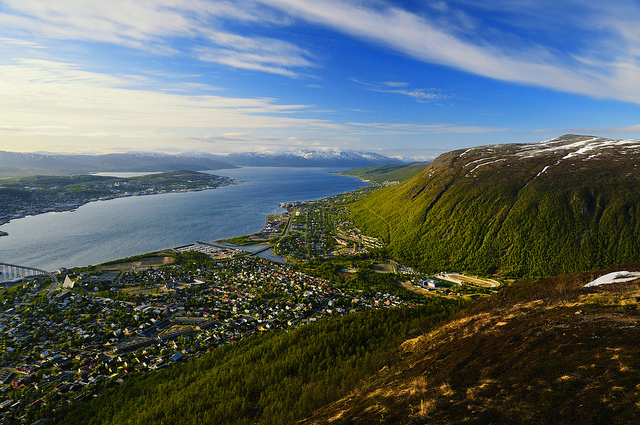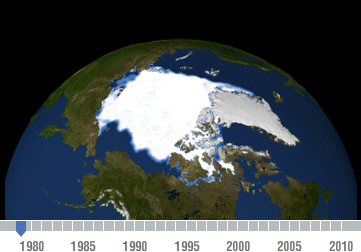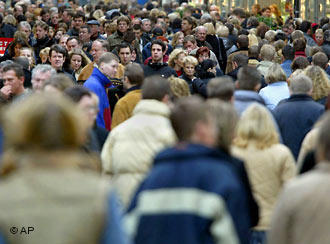Search Results for Tag: planet
Exploring the North – Further North
Arriving in Tromso, Norway, we are now located just at the Arctic’s doorstep. It is a quiet strange feeling, when you suddenly stand at the edge of something, that is normally so incredibly far away. If it’s far away from you as well and you derive from that that you don’t have to care – hang on. You actually should, as the Arctic often is referred to as earth’s air conditioner. And on hot summer days without (working) air conditioning, you feel perfectly well what it is good for.

Thought you might have seen enough snow, so I found this Tromso view of June 2010 for you (Photo: CC-BY-NC-SA-2.0: Nietnagel)
If you look at such pictures of the Arctic region it does not at all like an air conditioning. I was actually suprised that it can be that green in the Arctic region, as I always associate of snow and ice with Artic. What about you?
But this ice is only there in winter time – that’s when it fulfils it’s cooling job, by reflecting 80 percent of sunlight back to space which then cannot heat up the ocean or earth anymore. But from March on, ice starts melting due to increasing temperatures. The decreasing sea ice cover uncovers the dark oceans that absorbs the sunlight instead of reflecting it – the cooling air conditioning turns into a heating facility.
So far, the Arctic yet hasn’t been completely ice-free during the warm summer period. But you might remember scientists worrying last summerabout the small area that is left ice covered: The larger the ice free part, the more heat is absorbed by the ocean underneath – in turn, even more ice melts and a vicious circle starts.
Not on the edge of the Arctic, but on the edge of Arctic research, you find scientists working on how this influences the Arctic environment. Sometimes this influence can even be positive: Researchers recently found that microbes in the soil can fix more carbon in a warmer climate.
But yet, researchers cannot tell how Arctic ice cover will evolve, but they work for example on better models to predict what is going to happen. That is especially important, as many earth systems are connected: A warming Arctic sea also affects ocean currents for example, that – connected to each other – span over the whole planet. In turn, oceans take up less CO2 for example, and in consequence more of this greenhouse gas in the air, warms up the whole planet.
How did you celebrate Earth Day?
Earth Day was on Sunday, April 22nd, – a day to raise awareness about our planet and the growing threat of climate change. Organizers say more than 1 billion people across the planet took part! Celebrations across the globe marked the day, and the Earth Day Network says it collected more than 1 billion “Acts of Green,” or pledges to help the environment. From exhibitions to concerts to tree planting and cleaning up rivers and roads around the world, the young and old alike pitched in.
What was your act of green?
7 billion, and counting
There are now more than 7 billion people living on our planet! It’s a reason to celebrate and a stark reminder of how many people live and depend on the planet’s resources. Human population looks like it will continue to grow at breakneck speed, and that means it’s vital we make sure the earth can meet the needs of all 7, 8 or even 9 billion people – when we get to that point.
Climate change poses the biggest threat to meeting the basic food supply needed to nourish the world. Severe weather, changing rain trends and other turnarounds in global climate patterns have put important basic crops at risk – from wheat and corn to coffee. As the supply falls, the prices for food soar, making it too expensive for many in the world’s developing countries.
On top of that, more people means more energy use, and the need for clean, eco-friendly energy on a wide scale will become even more crucial in the coming years. So you’re now one of more than 7 billion people on the planet. What can every person do to keep the world safe?
Warm Planet, Cold Winter
If you haven't noticed, winter has been especially harsh this year. Much of Northern Europe is in a deep freeze, and any passengers flying through London, Frankfurt or Paris know all too well what this winter has done to travel plans. The U.S. and Canada have been slammed with major snow storms that have left people stranded and desperate during the holiday season. And it's only December…
Some people are wondering: if the planet is getting warmer, why is it so cold? The New York Times has an interesting op-ed article about the reasons behind this trend. The author, Judah Cohen, says increased snow cover in Siberia actually has a major impact on our climate–but he believes scientists have ignored the region's role in warming and cooling earth.
Cohen says snow cover in Siberia has changed jet stream patterns, pushing more air north and south rather than just east and west. That's why Northern Europe and the U.S. have seen such extreme winter weather in recent years. What do you think? Is Cohen's theory a good explanation?
Ancient Climate History
Researchers are drilling under the Dead Sea in Israel–almost 800 meters below sea level, to be exact. Why? Scientists are collecting rock samples far underneath the water level because they believe those sediments will be extremely well-preserved, and they could reveal some important clues about earth's history.
The International Continental Scientific Drilling Program (ICDP) includes a team of researchers from around the world, and they think the rocks they find under the Dead Sea will paint a much clearer picture of climate change history in the area around Bethlehem. So far, the workers have already drilled through around half a million years worth of sedimentary rock, which has helped them learn more about earthquake activity in the region.
And what researchers learn in Israel could help them understand more about climate change across the planet. One scientist who's taking part in the drilling mission said the group's findings will have a major impact on science and environment studies, and they could tell us a lot about natural resources in the area.









Feedback